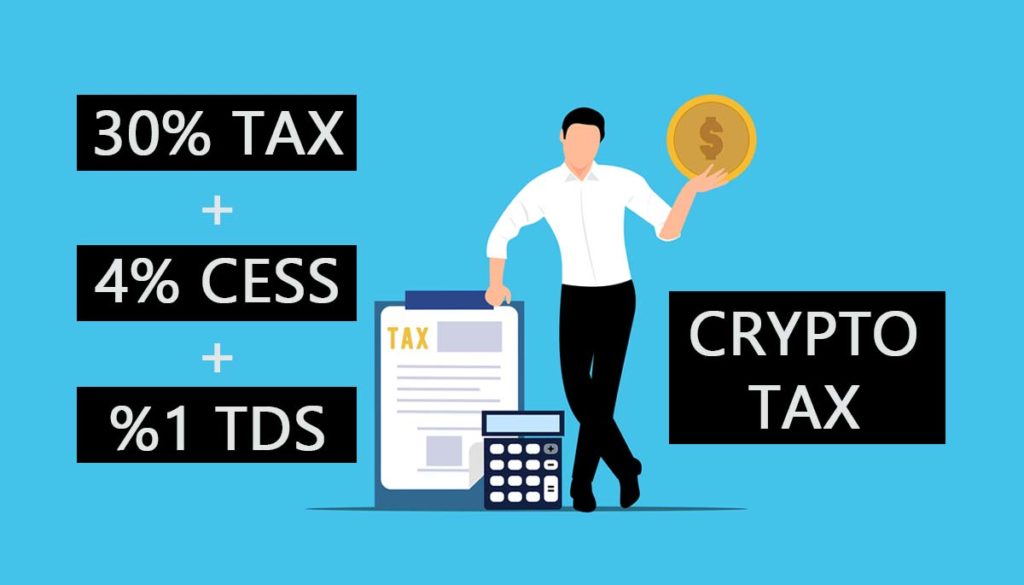
The trend of cryptocurrency is growing rapidly in India and with this the government has implemented tax rules on income from cryptocurrency. This article will help you understand how to report and pay tax on income from cryptocurrency in India, what are its legal aspects and what things are important to keep in mind.
As Indian government started taxing crypto income from the Union Budget of 2022,, it is must to file crypto taxes each year. Read below and know everything about How does India crypto tax filing work?
Cryptocurrency and Indian Tax Rules
Cryptocurrencies are now recognized as digital assets in India and it is taxable which is flat 30% + 1% TDS. In the financial year 2022-23, during union budget 2022 announcement, Indian Finance Minister Nirmala Sitharaman announced a 30% tax on income from cryptocurrency + 4% cess. Additionally, 1% TDS (Tax Deducted at Source) has also been implemented which will be deducted on every crypto transaction that crosses ₹50,000 in a year for regular investors, or ₹10,000 for individual investors. This 1% TDS is meant to help the government track crypto trades easily.
This rule applies to every type of income from cryptocurrency, whether it is profit or income from investment. So, you can’t hide your crypto related profit and if you do it is illegal and a punishable offense. If you have made a profit by selling crypto coins like Bitcoin (BTC), XRP, LTC, ETH, then you have to pay flat 30% crypto tax + 4% cess and 1% TDS*.
Calculating Crypto Tax
While calculating crypto tax, income from cryptocurrency is added to your total income. This profit is considered when you sell your crypto asset and get profit from it. Note that all expenses related to cryptocurrency such as brokerage fees or transaction fees will not be included in taxable income.
Example:
-
Purchase: You buy 1 Bitcoin on January 1, 2024, for ₹40,00,000 (INR 40 lakhs).
- TDS: If your total crypto transactions in the year exceed ₹50,000, 1% TDS (₹40,000 in this case) will be deducted at the time of purchase.
-
Sale: You sell the Bitcoin on March 1, 2025, for ₹50,00,000 (INR 50 lakhs).
- TDS: 1% TDS (₹50,000) will be deducted at the time of sale.
- Profit: ₹50,00,000 (Sale Value) – ₹40,00,000 (Cost of Acquisition) = ₹10,00,000 (INR 10 lakhs)
- Tax on Capital Gains: 30% of ₹10,00,000 = ₹3,00,000 (INR 3 lakhs)
- Cess on Tax: 4% of ₹3,00,000 = ₹12,000 (INR 12,000)
- Total Tax Liability: ₹3,00,000 (Tax) + ₹12,000 (Cess) = ₹3,12,000 (INR 3.12 lakhs)
- Profit Calculate: Profit from Sale – Tax on Capital Gains – TDS at Purchase – TDS at Sale
- Overall Profit: ₹10,00,000 – ₹3,12,000 – ₹40,000 – ₹50,000 = ₹3,12,000 = ₹5,98,0000
Importance of TDS
1% TDS means that 1% tax will be deducted on every crypto transaction. This tax is linked to the seller’s PAN card and paid to the government. This TDS will be adjusted in your total tax liability. For example, if you sold cryptocurrency worth ₹1,00,000 and ₹1,000 TDS was deducted on it, then this amount will be adjusted in your annual tax return.
I have given all calculation regarding the TDS – the TDS during purchased and TDS during sell above. So please check it once before investing or filing ITR.
Process of filing crypto tax
To file tax, first of all you have to keep a complete record of your crypto income. This should include details of your every cryptocurrency purchase, sale, and transaction.
Follow the following steps for tax filing:
- Calculation of Income: Include crypto income in your total income. Keep in mind that all types of income from cryptocurrency are taxed at 30%.
- Cess: 4% cess on capital gains will also be calculated.
- TDS Details: Keep a record of the TDS deducted on each of your transactions and adjust it against your total tax liability.
- ITR Form: Select the appropriate ITR form for your tax return. Income from cryptocurrency is included under ‘Income from other sources’.
- File Tax Return: File tax return with your income and TDS details. You can do this using an online portal or with the help of a tax advisor.
Crypto Tax Precautions
While filing taxes on cryptocurrency, make sure that you are following the correct tax rate under section 115BBH and 194S. Make sure you have accurately described all your crypto income. Also, calculate the health and education cess correctly so that your tax liability is completely correct. Apart from that, if you have invested on a foreign exchange, include it in your income as Indian tax rules apply to foreign income as well .
By following these rules you can ensure that your tax filing process is correct and legally sound. Never ever provide incorrect information as it can lead to heavy penalties.
Conclusion
Filing taxes on cryptocurrency can be confusing, but it is mandated by the government. The process can be simplified with the right information and records. Always describe your income correctly and seek help from a tax expert if you have any doubts. Compliance with crypto taxes is not only your legal responsibility but it is also a sign of being a responsible citizen.
The future of cryptocurrency in India is bright and investors can find new opportunities in this sector by following the tax rules. Consider tax filing as a necessary process rather than a burden and complete it on time and for this you can consult with your CA and file crypto taxes in India on time!





